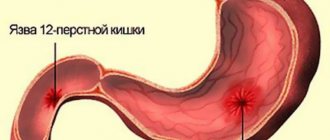More about alcoholic gastritis
Alcoholic gastritis is a serious disease in which the gastric mucosa is subject to severe transformation and damage under the influence of alcohol consumption. With the development of this type of pathology, the formation of erosions with bleeding is expected.
This type of gastritis differs from others in that the mucous membrane is not affected due to inflammation (the diagnosis is “alcoholic reactive gastropathy”). Alcohol entering the body increases the synthesis of hydrochloric acid, reduces the rate of blood circulation, prevents the formation of mucus, which performs protective functions, and does not allow cells to regenerate on their own.
Ethyl alcohol contained in alcoholic drinks is only 20% absorbed into the blood through the walls of the stomach, the remaining 80% passes through the digestive tract further, entering the intestines. The effect of alcohol on the digestive organ causes a reaction similar to a burn, while the structure of the gastric mucous layer is deformed and its functioning is disrupted.
Causes
From the name of the disease it is clear that the main risk factor is drinking alcohol. Exposure to ethanol provokes an increased secretion of hydrochloric acid, which disrupts the normal functioning of the mucous membrane, and its protective abilities are reduced, and the rate of tissue restoration decreases. Alcohol, especially strong alcohol (vodka, cognac) forms changes on the lining of the stomach that look like burns. Also, in combination with alcoholism, the following factors provoke inflammation of the mucous membrane:
- Stress, psycho-emotional stress;
- Smoking;
- Disturbed diet, snacking on the go, abuse of salty and spicy foods. Such food is used as a snack when drinking alcohol.
- Medicines – NSAIDs (acetylsalicylic acid), glucocorticoids;
- Constant fatigue, overwork;
- Harmful factors in production;
- Excess weight;
- Heredity.
Elements of alcohol-containing products have a chemical irritant effect. Directly and indirectly affects the digestive organs. A mediocre effect is that ethanol has a detrimental effect on the central nervous system. As a result, the brain loses the function of regulating the protective mechanisms of intestinal tissue.
Causes of alcoholic gastritis and risk factors
Alcoholic gastritis is usually associated with frequent drinking. In addition, there are a number of factors that provoke the development of this disease:
- genetic predisposition;
- cigarette abuse;
- frequent psycho-emotional stress, stress;
- overfatigue associated with physical activity;
- poor and unhealthy diet, lack of protein in foods;
- working in hazardous industries - the influence of certain chemicals can reduce the protective functions of the stomach and increase the likelihood of damage to its walls;
- excess weight;
- other gastrointestinal diseases.
The higher the degree of drink consumed, the longer it stays in the body and provokes the occurrence of various disorders. For example, vodka or gin can cause pylorospasm, can suppress motor-evacuation function, and over time, such disturbances can provoke a decrease in size and cessation of activity of the glands of the organ.
Types of disease
The disease manifests itself in acute and chronic forms. People who abuse alcohol are faced with an acute type of illness. Usually they perceive this situation as poisoning, which lasts for several days, and after recovery they completely forget about the incident. The likelihood of an acute condition depends on the following factors:
- The strength of the alcoholic drink. A high percentage of ethanol in drinks promotes slow absorption, causing stagnation and the mucous membrane being actively destroyed.
- Individual sensitivity.
- Food consumed. If you drink alcohol-containing drinks without food (without snacking), then their toxicity increases, and the effect on the walls of the stomach will be more aggressive.
Chronic gastritis occurs cyclically. Remission occurs with almost no unpleasant symptoms and can abruptly give way to exacerbation. This form of the disease eventually develops into an atrophic form or peptic ulcer.
According to medical statistics, in 20-80% of alcoholics the disease becomes chronic. This condition develops slowly as a result of systematic and regular alcohol consumption.
In medicine, there is an international classification of diseases - ICD-10. It is used to achieve unity of methodological approaches, as well as to determine general epidemiological goals. Gastritis is assigned code 29 according to ICD-10, and its types are indicated by additional numbers. In this system, alcoholic gastropathy is indicated by code 29.2.
Types of alcoholic gastritis and symptoms of the disease
Alcoholic gastritis is divided into two types: acute and chronic. If the cause of the appearance of the acute form is the consumption of a large volume of alcoholic beverage over a short period of time, then the cause of the appearance of the second form is considered to be constant consumption of alcohol.
Gastric juice is produced in small quantities due to the malfunction of the stomach, it becomes difficult for food to move forward. When the process occurs over a long period of time, the cells of the stomach die, the activity of the gastric glands noticeably slows down, and as a result the disease develops.
Also, an exacerbation can be characterized by pronounced symptoms, which may intensify after eating food or appear regardless of its consumption. The first signs of exacerbation are:
- nausea or vomiting;
- aversion to food;
- belching, polydipsia;
- heaviness in the stomach, flatulence;
- constipation or diarrhea.
The symptoms of chronic alcoholic gastritis are slightly different from the acute course of the disease. The pain syndrome is replaced by a pulling sensation in the epigastric region, patients often regurgitate the food they eat. Dyspeptic symptoms (vomiting with the presence of mucus or bile), shortness of breath, poor appetite, hand tremors, sweating, and rapid heartbeat may occur.
Alcoholic gastritis can be accompanied by high or low acidity. With increased acidity, you may experience a feeling of acidity in the mouth, rumbling in the stomach, and nausea in the morning. In case of low acidity, a burning sensation is felt in the sternum and some discomfort in the stomach.
The severity of signs of alcoholic gastritis depends on the form of the disease and the severity of its course.
The main difference between alcoholic gastritis and another type of this pathology is the reduction or disappearance of symptoms after drinking a small dose of alcohol.
Chronic alcoholics may experience the following complications:
- impaired sensitivity of the limbs, limited movement. This symptom occurs due to damage to the nerves connecting organs and limbs to the brain and spinal cord.
- amyotrophy. Over time, the tissues of the muscles of the limbs become smaller in volume and become thinner, which leads to their weakening.
- tachycardia, shortness of breath. As the disease progresses, damage to the cardiovascular system develops, which leads to attacks of rapid heartbeat.
Diagnostics and consultation with a doctor
Only an experienced doctor can determine alcoholic gastritis. The symptoms are largely similar to those of other gastrointestinal diseases. The doctor, after conducting a whole range of laboratory tests and tests, makes a diagnosis based on the indicators.
- A detailed study of the patient's medical history. The doctor will ask about the general condition, factors of hereditary predisposition, try to find out the reasons that gave rise to the development of gastritis, determine the symptoms and treatment.
- A patient with alcoholic gastritis has sagging and flaccid muscles. In the process of feeling the abdomen, painful sensations arise.
- The doctor does a general blood test to identify white blood cells and determine the number. Usually, with the disease, there is a hanging of leukocytes in the blood. The blood thickens, the body loses water and valuable nutrients through constant vomiting.
- The doctor conducts an analysis for Helicobacter pylori - bacteria that are the first initiators of gastrointestinal diseases. If bacteria are present in large quantities, it is clear that inflammatory processes are occurring in the patient’s body. Bacteria are detected by blood and stool tests.
In addition to the mandatory examinations and tests, the doctor will prescribe additional ones. Spiral computed tomography is often prescribed.
Consequences of alcoholic gastritis with delayed therapy
When no treatment is given and the symptoms have disappeared, this is considered a bad sign. Most often, this indicates that erosive processes have begun on the walls of the esophagus, and this process may also be accompanied by the appearance of blood in the stool. If this occurs, you must immediately consult a doctor for medical help. Otherwise, intra-abdominal bleeding may occur, leading to death in the shortest possible time.
Also, delayed treatment or its complete absence is fraught with the spread of alcoholic gastritis to healthy organs. A patient who does not receive treatment on time may develop the following diseases: hepatitis, pancreatitis, cholecystitis, cirrhosis of the liver.
The greatest danger in terms of consequences comes from a sluggish type of alcoholic gastritis. Without appropriate treatment, this form of the disease spreads to healthy organs - the liver, pancreas. Often gastritis can be accompanied by gastroduodenitis or inflammation of the duodenum. Due to lack of appetite, bile stagnation may occur and cholecystitis may develop.
Chronic alcoholic gastritis is dangerous due to complications such as stomach or duodenal ulcers, malignant neoplasms, and the development of pancreatitis.
Possible complications
In the absence of proper treatment, alcoholic gastritis causes the following complications:
- bleeding caused by erosions;
- pancreatitis;
- cholecystitis;
- peptic ulcer;
- stomach cancer.
The disease can provoke inflammation of the mucous membrane, so it carries the risk of developing a stomach ulcer. The damage caused to the body can cause other serious complications. But with timely treatment, the prognosis for patients is favorable and guarantees a full recovery.
Diagnosis of alcoholic gastritis
Only an experienced doctor can diagnose alcoholic gastritis. The symptoms of gastropathy are similar to those of other diseases, so a correct diagnosis can only be made after examination. Diagnostics consists of the following activities:
- studying the patient’s medical history, complaints, clarifying the issue of hereditary predisposition to the disease and the factors that provoked the onset of the disease;
- personal examination, during which muscle sagging and pain when palpating the abdominal area are observed;
- laboratory analysis for the presence of the bacterium Helicobacter pylori in the body, which indicates the development of an inflammatory process in the stomach;
- general blood analysis. In the presence of alcoholic gastritis, an increased level of leukocytes can be observed; in addition, blood thickening is possible due to frequent vomiting and diarrhea, which dehydrate the body;
- FEGDS. This method allows you to examine the mucous membrane of the stomach, duodenum and esophagus; the procedure also determines the presence of erosions and ulcers, as well as areas of inflammation;
- Additional prescribed studies may include ultrasound, spiral CT, contrast radiographs, manometry, and biopsy.
Diagnostics
Before treating the disease, a thorough examination is necessary. The doctor needs to be sure that this gastritis arose precisely from the consumption of alcoholic beverages, since there are other types of this disease. And it is necessary to distinguish it in order to prescribe precise therapy.
The examination begins with interviewing the patient, listening to his complaints, asking about heredity and frequency of drinking alcohol. Next, a visual examination of the appearance is performed - with gastritis, the skin is flabby, and upon palpation there is pain in the abdominal area.
Blood is donated to a clinical laboratory for a general blood test, where the process of inflammation increases the number of leukocytes and the erythrocyte sedimentation rate. An increase in ESR means blood thickening due to dehydration, which causes frequent vomiting and diarrhea. The causative agent of the disease, Helicobacter pylori, is detected in stool, blood or a breath test. During FGSD, using a probe with a camera, the condition of the mucous tissues of the stomach, esophagus and duodenum is assessed and material is collected for histological examination. Additionally, an ultrasound of the abdominal organs and an x-ray are prescribed.
Treatment of alcoholic gastritis
Alcoholic gastritis takes a little longer to treat than other types of disease. But it is quite treatable, especially if diagnosed at a young age, when stomach cells have high regenerative abilities. The most important condition for successful treatment is an absolute cessation of drinking alcohol and temporary limitation of smoking.
Medicines are prescribed according to the manifestations of alcoholic gastritis. In case of severe dehydration, salt droppers and vitamin complexes are prescribed to restore the required amount of substances lost by the body. In addition, the following medications are prescribed:
- gastroprotectors - to restore the gastric mucosa - “Solcoseryl”, “Sucralfat”;
- anti-inflammatory drugs - Novobismol, Pepto-Bismol, De-Nol;
- painkillers - “Buscopan”, “No-shpa”, “Galidor”, “Papaverine”;
- with increased secretion - Ranitidine, Omeprazole, Famotidine;
- to stimulate enzyme formation - “Limontar”, “Plantaglucid”, mineral water “Borjomi” or “Narzan”.
- for replacement therapy - “Creon”, “Festal”, “Mexaza”, “Cholenzim”, “Abomin”.
Therapeutic measures for alcoholic gastritis offer a competent combination of drug therapy and a gentle diet, which aims to restore damaged stomach walls and improve digestion. Treatment is usually carried out on an outpatient basis. For patients under 50 years of age, the disease can be cured in 2–3 weeks.
What to do with alcoholic drinks for gastritis
One of the most common questions among people with gastritis is: is it possible to drink vodka, gin, wine, beer, and other alcoholic drinks; will this affect the treatment? Of course, from the doctors, the answer will be unequivocal: you should not drink alcohol if you have gastritis and, especially if you have an ulcer, in any form, especially if you are being treated with antibiotics. But often people simply cannot resist drinking. The reasons may be different and it is not necessary that a person is addicted to excessive alcohol. This could be a corporate party, a birthday or another occasion when refusing a glass of good champagne, wine or a stronger drink can offend an important and loved one.
- If the disease is in an acute stage, then drinking any alcohol is strictly prohibited.
- If the disease is in remission, in rare cases it is allowed to drink a glass of cognac or vodka.
But you should follow certain rules for drinking alcohol:
- You should not take alcohol with gastritis together with medications, otherwise the consequences can be very negative and unpredictable.
- Alcoholic drinks must only be of high quality; any substitutes are excluded.
- They can be consumed only after a good snack, otherwise the disease will go into the acute phase.
- Wine for gastritis promotes excessive production of hydrochloric acid in the stomach, so it is also not recommended to drink it.
- If, after drinking alcohol, the symptoms of gastritis with high or low acidity worsen, then you should not take medications until the ethanol has completely disappeared. It is better to do a gastric lavage and drink some sorbent. It is allowed to use medications against gastritis a couple of hours after gastric lavage.
As for weaker alcohol, recently the opinion has spread about the beneficial effects of unfiltered beer on gastritis. German scientists claim that you can drink unfiltered beer if you have gastritis or ulcers, that it will better relieve pain and calm the stomach thanks to hops. It also disinfects and removes carcinogens from the body. Active substances from malt and hops prevent the development of bacteria that contribute to the development of gastritis. In Russia, such data have not been confirmed.
Some people with alcoholic gastritis, after treatment has been carried out, feeling significant relief from their condition, begin to slowly drink alcoholic beverages. And often this provokes complications of the disease. If an erosive form of gastritis is diagnosed, then drinking alcohol will lead to an ulcer.
In conclusion, I would like to say that alcoholic gastritis is completely curable. This pathology requires a change in lifestyle, adherence to a strict diet, in which, if at all, alcohol has a tiny place.
Diet for alcoholic gastritis
Treatment of acute alcoholic gastritis is recommended to begin with a transition to a strict diet. During the first days, you are not allowed to drink anything other than warm mineral water, plain water, and weak tea. Further, the diet includes vegetable soups, stewed or boiled meat or fish dishes, porridge, jelly, low-fat dairy products, boiled or steamed vegetables, tomatoes, and baked fruits.
It is prohibited to use:
- alcohol;
- smoked, spicy, fatty and fried foods;
- carbonated drinks;
- chocolate;
- baked goods;
- hard cheeses;
- foods that irritate the stomach (tomatoes, legumes, radishes, citrus fruits, dates, gooseberries).
Dishes should be soft, pureed, and at a comfortable temperature. The diet should be small, but frequent. In addition, you should not eat dry and quickly; food should be chewed well for better impregnation with salivary enzymes.
For alcoholic gastritis, freshly squeezed berry juices (raspberry, strawberry, strawberry), compotes, and jelly will be beneficial.
Video on the topic:
Diet
Foods and diet affect the health of the digestive system. In acute cases, eating is not recommended for the first 2-3 days. Only drink plenty of warm mineral water without gas. Then they switch to kefir, liquid, semi-liquid porridges, vegetable soups, jelly, and low-fat dairy products. Avoid spices and carbonated drinks. Over time, they switch to a diet with less strictness.
During the period of remission, table number 2 is prescribed. This is a rational therapeutic diet for patients with intestinal pathologies. The main goal is to protect the mucous membrane, enrich the diet with protein, iron and vitamins. Limitations of products containing coarse fiber - whole grain cereals, bran, flour, flour products, nuts and legumes. The consumption of pure cow's milk is prohibited. Exclusion of spicy, salty, smoked, fried foods.
Before eating, food is prepared by boiling, steaming, stewing and baking. The products are crushed to reduce injuries to the digestive tract. Small meals up to 5 times and at least 1.5 liters of water per day.
Alcoholic gastritis and traditional methods of treatment
Traditional methods help to facilitate drug treatment. The following traditional medicine recipes can help with alcoholic gastritis:
- 1 hour before meals, it is good to drink half a glass of fresh carrot juice, the course of therapy is 10 days, half a glass;
- White cabbage, the juice of which can be taken an hour before eating the main meal, has a good effect on the gastrointestinal tract;
- If you have high acidity, it is good to drink potato or beetroot juice on an empty stomach in the morning; blackcurrant juice, grape juice, and rosehip infusion will have the same effect. And sour apples, beans, apricots increase acidity when its level is low;
- on an empty stomach 30 minutes before breakfast, it is recommended to drink warm boiled water - a glass with the addition of 2 teaspoons of honey;
- two tbsp. spoons of sage are poured with hot water and left for several hours, drink it 3-4 times a day, 1 tbsp. spoon;
- Another infusion that has a good effect on the mucous membrane: take 1 teaspoon of centaury, 2 tbsp. spoons of mint, 2 tbsp. spoons of golden mustache juice, 2 glasses of water. Mint and centaury are mixed, poured with boiled water, and left for half an hour. After straining, add the golden mustache. This remedy is taken several times a day, 3 glasses;
- for alcoholic gastritis with high acidity, use St. John's wort, valerian root, rhubarb root, and burdock in the form of infusions.
Treatment
The main goal is to stop the acute condition and prevent complications. Mandatory treatment of alcohol dependence, the appointment of gentle nutrition and drug therapy. Medicines are symptomatic therapy aimed at relieving the manifestations of the disease:
- Painkillers, antispasmodics - to reduce pain and alleviate the condition, such as drotaverine, no-shpa, spazgan;
- Anti-inflammatory drugs – denol, pepto bismol;
- Antacids - Maalox, Gastal, Rennie. When the acidity content is higher than normal, they help get rid of heartburn and belching;
- Enzyme preparations for low acidity - limontar, prozerin;
- Gastroprotectors for the regeneration of mucous membranes;
- For severe dehydration, infusion of aqueous saline solutions combined with vitamins is used.
As a stimulating therapy in combination with medications, it is advisable to use folk remedies. Fresh carrot juice, cabbage juice and sage infusions promote healing of the lining of the gastrointestinal tract.
Disease prevention
Prevention of alcoholic gastritis is based on following the principles of a healthy diet and completely abstaining from drinking alcohol.
List of references: https://diseases.medelement.com/disease/alcoholic-gastritis-k29-2/4609 https://medekb.ru/alkogolnyy_gastrit/ Gastroenterology. National leadership / Ivashkin V.T., Lapina T.L. - 2021. Pathophysiology: textbook / ed. Novitsky V.V. – 2018 Pharmacology: atlas / Lullman H., Mohr K., Hein L.; edited by Svistunova A.A. – 2021. https://mknc.ru/album_view.php?album_id=9507&dir=gastrit https://www.gastroclinic.ru/diseases/gastrit/ https://www.panatceya.ru/polezno/lechenie/posledstviya- alkogolizma/gastrit/ Notes from the author of the article, based on personal experience. This material is purely subjective and is not a guide to action. Only a qualified specialist can determine an accurate diagnosis and prescribe treatment.
Last modified: 03/18/2020
Clinical picture of the disease
The main symptoms of alcoholic gastritis are nonspecific:
- severe epigastric pain;
- decreased appetite;
- heartburn;
- belching;
- feeling of thirst;
- nausea, mild vomiting;
- tendency to constipation.
Pay special attention to signs of gastric bleeding:
- black tarry stools;
- vomiting with blood;
- pale skin;
- frequent weak pulse;
- general weakness and shortness of breath.
Researchers point out that some symptoms of alcoholic gastritis are atypical for other forms of stomach inflammation. This is spontaneous vomiting, which develops without nausea and loss of appetite, as well as an atypical pain syndrome.
Due to concomitant hepatitis, cholecystitis, pancreatitis, pain can spread throughout the entire upper abdomen. In addition, drinking alcohol often dulls pain. Many patients note a decrease in the severity of symptoms after drinking alcohol.
Complications that can develop with advanced gastritis
If an alcohol addict does not stop drinking and begins to receive treatment, he will develop health-threatening complications. Among them:
- Ulcer of the stomach and duodenum.
The likelihood of such a scenario is especially high if ulcers are revealed on the mucous membranes of the organ during the examination, H. Pylori is found in the patient’s body, and the drinker often used non-steroidal anti-inflammatory drugs to get rid of pain after binge drinking.
- Stomach bleeding.
It is a consequence of ulcers and erosive gastritis. Manifested by the presence of blood in the stool, dizziness, and weakness. Also, when there is bleeding, the feces may turn black. - Atrophic damage to the gastrointestinal mucosa.
It manifests itself as thinning of the mucous membrane, the formation of small scars. The disease leads to a decrease in the number of active cells in the stomach, which impairs the absorption of vitamins and microelements. With advanced atrophy, the risk of cancer increases, so it is important to begin treatment of this form of gastritis at the earliest stages. - Anemia.
It is the result of blood loss that occurred due to gastric bleeding. It may also be due to the fact that the disease interferes with the absorption of vitamin B12. And this also creates conditions for the occurrence of symptoms of anemia. - Pernicious anemia.
Doctors call this condition “malignant anemia.” It occurs in alcohol addicts with autoimmune gastritis, in which the protein responsible for the absorption of B12 is not secreted. The latter plays a major role in the production of red blood cells and the restoration of nerve cells. - Stomach cancer.
One of the most terrible complications of advanced gastritis. A condition in which a tumor forms in the stomach, threatening the health and life of the patient.
Considering the striking negative symptoms of gastritis from alcohol and the dangerous consequences that the disease can lead to, it becomes clear why gastroenterologists recommend contacting them at the first sign of gastrointestinal dysfunction. Take care of your health and do not abuse alcohol-containing drinks.
Reasons for the development of pathology
This disease is usually classified as toxic gastritis. It is characterized only by a disorder of gastric acid secretion, and the person never develops bleeding, as with an ulcer.
The main reason for the development of this type of gastritis is the toxic effects of alcohol:
- In case of gastritis, alcohol in large quantities disrupts the production of hydrochloric acid in the stomach, as a result of which the process of emptying it slows down. Large doses of alcohol reduce the protective function of the mucous membrane.
- The chronic form of the pathology is associated with long-term alcohol consumption, as a result of which the secretory and motor functions of the stomach are disrupted.
Thus, ethyl alcohol has the following negative effects:
- Slows down contractions of the stomach walls;
- Disturbs the blood supply to the organ;
- Disturbs the secretion of gastric acid;
- Inhibits the synthesis of the mucus layer, which performs a protective function;
- Inhibits recovery processes.
Symptoms of the disease
Often, a drunk or constantly drinking person cannot distinguish a hangover from manifestations of gastritis. In this case, relatives and friends can come to the rescue, but only a doctor can determine the symptoms and treatment. Any doubts about the diagnosis require calling an ambulance. If you cannot adequately assess the patient's condition, be sure to seek qualified medical support. Doctors will begin to treat the patient in the first minutes.
The symptoms of the disease depend on the age of the patient, the amount of alcohol consumed and how long the person has been drinking alcoholic beverages.
Symptoms of alcoholic gastritis:
- pain in the epigastric region, while the patient may complain of aching, pulling or sharp pain;
- feeling of nausea before eating or in the morning on an empty stomach;
- gagging, vomiting, which can occur spontaneously or after eating; alcohol often relieves gagging;
- heartburn or esophageal reflux, which appears in a lying position due to the reflux of bile into the esophagus;
- feeling of thirst, belching;
- difficulty defecation.
Some or all of the symptoms may disappear when taking a new portion of alcohol-containing products and then appear again in the future. The diagnosis in this case can only be made in a medical institution after special examinations.
If a person drinks alcohol for a long time, the symptoms of the disease have their own specifics. Typically, alcoholics suffer from all systems of the body - from the cardiovascular to the digestive. Typically, these systemic phenomena require serious medical or surgical treatment.
- Tachycardia. Sign: rapid pulse;
- Peripheral polyneuropathy, in which you feel tingling in the limbs, numbness, pain in the fingers and toes, decreased sensitivity of the limbs;
Just 50 grams of pure ethyl alcohol can cause uncontrollable vomiting, withdrawal symptoms, and subsequently alcoholic gastritis.
- Muscle atrophy, which results in weakness in the legs and arms. Muscle fibers become thinner and this leads to general weakness, muscle flaccidity and inability to perform physical activity, which reduces overall quality of life.
Prognosis and prevention
The prognosis of the disease is favorable in the acute form of the disease, when the patient follows all the doctor’s prescriptions and recommendations. In case of a chronic illness, it is strictly forbidden to drink alcoholic beverages, since gastritis can go into the stage of relapse.
Prevention of the disease consists of giving up bad habits. If the stomach has high acidity, doctors recommend using drugs that inhibit the acid-forming function of the organ. If you have low acidity, you need to take enzymes. Preventive measures include maintaining a healthy lifestyle and following a diet. It is recommended to eat food in small portions five to six times a day, drink clean water, herbal teas and juices that contain large amounts of vitamins.
Alcoholic gastritis can be cured. This disease requires changing your lifestyle, following a diet and giving up alcoholic beverages.
Forms of the disease
There are two forms of the disease – acute and chronic.
Acute reactive alcoholic gastropathy develops after a single dose of alcoholic beverages. Individual dosage may vary, but the risk of pathology formation increases if more than 50 ml of pure ethanol enters the human body daily. The chronic format of alcoholic gastritis is formed against the background of prolonged consumption of alcoholic beverages. The functions of the stomach are disrupted, the production of gastric juice decreases, which slows down the progress of the food coma. There is a gradual death of mucosal cells and over time, chronic gastropathy can transform into atrophic gastritis and later an ulcer.
Classification and Code according to ICD 10 of alcoholic gastritis
Alcoholic gastritis is mentioned in all modern medical reference books. According to the International Classification of Diseases, 10th revision, it is assigned code K 29.2. Since inflammatory processes do not develop on the damaged epithelium, it received the specific name “reactive gastropathy.”
The disease is diagnosed in the adult population, with varying frequencies in both men and women over the age of 55-60 years. In the structure of gastrointestinal pathologies, it ranks 19th, and according to statistics, 0.5% of all cases end in death. Like other types, alcoholic gastritis occurs in two forms
According to the International Classification of Diseases, 10th revision, it is assigned code K 29.2
The main cause of the formation of reactive gastropathy is alcohol abuse. Ethanol, which is part of it, enters the organs of the upper digestive tract and irritates the mucous membrane.
Since this type of pathology has significant differences from the “classic” ones, treatment of alcoholic gastritis is based primarily on lifestyle correction - in other words, the patient first needs to get rid of his addiction to alcohol. In this case, therapy is indicated in a hospital setting (in the presence of bleeding), but more often on an outpatient basis. There are no surgical interventions for this form of pathology.
Depending on the complexity of the clinical case and the stage of the disease, the duration of treatment ranges from 4 days to three weeks. Important methods of complex therapy are the prescription of medications and nutritional correction. The main condition for the successful implementation of therapeutic measures and achieving a positive result is the patient’s complete refusal to drink alcoholic beverages of any strength.
Acute alcoholic gastritis
Manifests itself in the form of an attack after drinking a large dose of alcohol. Its consequence is intoxication, the symptoms of which persist for several days.
Chronic alcoholic gastritis develops in people who regularly drink alcohol
Considering this condition to be normal, the patient, as a rule, does not go to a medical facility, but prefers natural restoration of health. A repeated outbreak may occur when drinking a moderate amount of alcohol, but with a higher percentage of alcohol, or when there is no food in the stomach.
Chronic alcoholic gastritis
Develops in people who regularly drink alcohol. A feature of the chronic course of the pathology is the alternation of exacerbations with periods of remission. In the first case, the situation described above occurs, in the second, the clinical picture is blurred, since the symptoms are absent or have little severity. Some patients periodically experience hunger pain in the stomach, nausea (especially in the morning), vomiting, and a feeling of intense thirst that does not go away even after drinking liquid.
Causes
Having understood the essence and determined the types of the disease, it is important to determine the causes of its occurrence.
External factors:
- most often the stomach is affected by Helicobacter pylori;
- unhealthy diet - abuse of spicy, fried, salty foods;
- excessive consumption of alcoholic beverages (alcoholic gastritis);
- taking hormonal drugs - glucocorticoids, aspirin and its varieties, antibiotics for oral use;
- radiation and chemical damage to the mucous membrane;
- helminthic infestations;
- prolonged stress and depression.
Internal factors:
- family history (gastritis in close relatives);
- reflux from the duodenum into the stomach;
- chronic infections;
- disorders of the immune status;
- hypo- and vitamin deficiencies;
- hypoxemia, etc.
Not least on the list in terms of prevalence and significance in the structure of the disease is alcoholic gastritis. Systematic consumption of ethyl alcohol and drinks made on its basis, in all cases without exception, leads to damage to the gastric mucosa.
This disease is usually classified as toxic gastritis. It is characterized only by a disorder of gastric acid secretion, and the person never develops bleeding, as with an ulcer.
The main reason for the development of this type of gastritis is the toxic effects of alcohol:
- In case of gastritis, alcohol in large quantities disrupts the production of hydrochloric acid in the stomach, as a result of which the process of emptying it slows down. Large doses of alcohol reduce the protective function of the mucous membrane.
- The chronic form of the pathology is associated with long-term alcohol consumption, as a result of which the secretory and motor functions of the stomach are disrupted.
Thus, ethyl alcohol has the following negative effects:
- Slows down contractions of the stomach walls;
- Disturbs the blood supply to the organ;
- Disturbs the secretion of gastric acid;
- Inhibits the synthesis of the mucus layer, which performs a protective function;
- Inhibits recovery processes.
The risk group includes people who experience constant stress and overwork. They are obese or work in hazardous industries.
Typically, treatment for alcoholic gastritis is not difficult, especially when the patient is young. But the main condition for successful therapy is a complete cessation of alcohol and a temporary cessation of smoking. Therefore, the answer to the question of what alcoholic drinks you can drink with gastritis is unambiguous.
First, the doctor prescribes a strict diet. For the first two days, the patient must completely refuse food; he is allowed to drink clean water, weak teas and still mineral water. Then the diet includes jelly, vegetable broths, porridges, boiled vegetables, baked fruits, baked fish and meat. In this case, meals should be in small portions up to six times a day.
The disease is treated by a gastroenterologist. Depending on the symptoms of the pathology, the doctor prescribes appropriate medications. When the body is dehydrated as a result of vomiting and diarrhea, vitamins and saline droppers (solutions), gastroprotectors are used to restore the gastric epithelium, for example, Sucralfate.
Alcohol and gastritis
Doctors definitely do not recommend drinking any alcohol for this disease. But some patients simply cannot resist drinking a small amount of alcohol, for example, at some event. It should be noted that in the acute stage, gastritis and alcohol are simply incompatible; drinking alcohol can provoke the development of serious complications.
- You should not take alcohol together with medications, as complications may develop.
- Vodka or cognac for gastritis should be of high quality.
- You should not drink alcohol on an empty stomach, as this can provoke the development of an acute period of the disease.
- It is not recommended to drink red wine if you have gastritis, as it provokes the production of hydrochloric acid.
- If the disease worsens after drinking alcohol, you should not take medications until it is completely eliminated from the body. To do this, you can perform a gastric lavage and drink a sorbent, and two hours later take the medicine.
German scientists claim that you can drink unfiltered beer for gastritis, as it relieves pain and has a calming effect on the stomach, disinfects it and removes toxins from the body. But in our country such data is not confirmed.
ethnoscience
Herbal infusions of plantain, string, St. John's wort, thyme, centaury, calamus and dried grass are used as traditional medicine recipes. These herbs are mixed in equal proportions, add half the volume of peppermint, pour boiling water and leave for twelve hours. Then the product is filtered and used fifty grams before meals several times a day for one month. Then they take a two-week break and repeat the course of treatment again.
It is recommended to regularly consume raw eggs, which have an enveloping property and have a soothing effect on the gastric mucosa.
In the chronic form of the pathology, it is recommended to use celery juice, green tea or anise decoction.
The main reason is alcohol abuse. In addition, the disease is often additionally provoked by various circumstances. In such cases, a person, consuming alcohol even in small doses, only aggravates the situation.
Factors contributing to the development of alcoholic gastritis:
- constant stress;
- overwork;
- malnutrition;
- harmful working conditions;
- presence of gastrointestinal diseases;
- excess weight;
- smoking;
- genetic predisposition.
Bad habits only enhance the effect of ethanol, which promotes excessive production of gastric juice, disrupts the digestion process, and prevents the restoration of damaged cells.
Therapy
Treatment of alcoholic gastritis is quite easy, especially if the person is young and the cells of the gastric mucosa have a high ability to regenerate.
- The most important condition is a complete cessation of smoking and drinking alcohol.
- To begin with, the sick person is prescribed a strict diet. For the first two days, you can only drink water, heated mineral water and weakly brewed tea. Then they include in the diet jelly, soups with vegetable broth, liquid porridges, steamed vegetables, baked fruits, stewed, steamed meat and fish dishes.
- Meals should be fractional, it is better to heat the food to 50 degrees.
- You should not eat dry food; you should chew food thoroughly so that it begins to initially break down under the influence of salivary enzymes.
Treatment with medications is prescribed depending on the manifestations of the disease.
- If the body is dehydrated, vitamin complexes and saline droppers are prescribed.
- Gastroprotective drugs are also prescribed to restore the gastric mucosa, such as Solcoseryl and Sucralfate.
- You should drink mineral waters "Borjomi" and "Narzan", anti-inflammatory drugs De-Nol, Peptobismol, painkillers Papaverine, No-shpu, enzymatic drugs Limontar, Plantaglucid and drugs for replacement therapy, such as Festal, Creon, Cholenzym.











